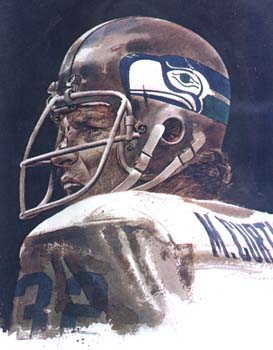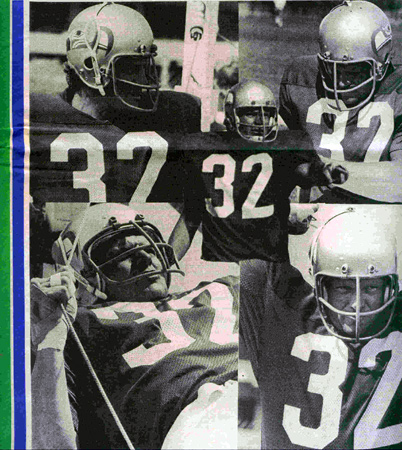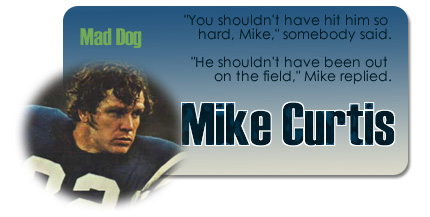
Football's Most Wanted: the top 10 book of the great game's outrageous characters, fortunate fumbles and other oddities
Nicknamed the "Animal"...Mike Curtis was so tough that he chewed the bars off his face mask. He once ate the window panes of the team bus. In practice, none of his teammates was safe from his wrath. On December 11, 1971, in a game against the Miami Dolphis, Curtis knocked unconscious a fan who made the mistake of running onto the field. Curtis admitted that he played football because it was the only way he could hit someone and get away with it.
One Knee Equals Two Feet
by John Madden
At a 1971 game in Baltimore, the Colts' defensive unit was waiting for the Dolphins to come out of their huddle when a thirty-year-old fan suddenly ran onto the field and grabbed the ball. All the other Colt players stood there stunned, but Mike [Curtis] reacted with a linebacker's instincts. Mike sent the man sprawling with what was described as a "crunching arm block from the rear." Wham, the guy had to be scraped off the field. He was arrested and fined $100 for disorderly conduct, spent a couple of hours in jail, then spent a couple of hours in a hospital being treated for dizziness and a hip injury."You shouldn't have hit him so hard, Mike," somebody said.
"He shouldn't have been out on the field," Mike replied.
Bill Belichick Press Conf Transcript
Source: New England Patriots Web Site
3 Oct 03
by New England Patriots
Q: Did you coach Mike Curtis?BB: When I went to Baltimore in 1975, Mike was there. Early in the '75 season I would say maybe about the fourth or fifth game right around the trading deadline, early October say about this time, he was traded to Seattle.
Q: What were your impressions of him in the short-short time you were there?
BB: Well it wasn't that short because we went to training camp in July 5th and we had six preseason games and all of that. I probably saw him play 10 games, which is really about half a season's worth. Mike, first of all, is very smart. We had put in a new defense that year. Maxie Baughan was the defensive coordinator and he put in the Redskin's defense, which was a very complicated defense that George Allen ran over there. There were 8,000 adjustments on every single play and three different code words for every adjustment. It was very hard to get. Mike being the middle linebacker really controlled the whole defense and all of the checks and all of the calls and everything else. Mentally, he was outstanding. He was quick, explosive guy, and wasn't as big and powerful as say a guy like [Dick] Butkus, but he was a little smaller but I would say he was quicker and he had a very good initial explosion. So he was a very good blitzer because he could really accelerate to the line of scrimmage. He came with a lot of juice. He was an explosive hitter but he anticipated things very well and could recognize formations and read stances and all of that kind of thing. A lot of times he could call the play before it was run.
Q: We talked about toughness yesterday and I am sure that you have seen the NFL Films story too...
BB: Oh, when he whacked that guy who came in and picked up the ball? [Laughter]
(That's from Super Bowl V)
Q: [Laughter] He just seemed so intense.
BB: Mike was intense.
Q: Do you remember, having been in Annapolis, watching him play?
BB: Sure. He played at Duke and played Navy when he was at Duke. He was a real good college football player too. But he was very intense. He was a very intense practice player and very competitive. When the offense would go against the defense that was just like a division game for him. He would play it all out and again, because of the multiple defenses that we had at that time, the reason I say this is because later on in the year we cut it back to about two defenses and ended up winning nine games. But as the play would be called and Mike would figure out what the play was that either Bert Jones or [Marty] Domres was calling or if they would audible, then he would change the defense just to stop that play. He had a little bit of an edge to him too that ultimately led to him being traded to Seattle. Joe Thomas traded him.

Q: Because he was cuckoo?
BB: Well, no. What happened the year before, I wasn't there so this was relayed second hand, but basically the way I heard the story was that they went up to play Philadelphia in the maybe the third or fourth game of the 1974 season. [Howard] Schnelenberger was the coach. Whatever happened during the game between the press box and the headphones and whoever was down on the sideline telling Schnelenberger who to play at quarterback and so forth. Anyway at the end of the game, they came down in the Philadelphia locker room and fired Schnelenberger. I am not sure if they knew who the head coach was going to be or not but Joe Thomas told the team that he was going to be the head coach and Joe was also the general manager at that time. Mike kind of spoke out against that right at the time and that led to a continued confrontation between the general manager and the player. Then coincidentally Mike opened up, I am not sure if it was his first restaurant or second, but he had a big opening and opened up a restaurant in the offseason, right around August or September of the 1975 season which was really a big deal. A lot of those guys had them, [Alan] Ameche had all of his restaurants. Johnny Unitas' Golden Arm, [Gino] Marchetti's, which ended up being Kentucky Fried Chicken. Right down the line, they all had them. Curtis had one too then about two to three weeks later after that restaurant opened he was in Seattle. It's about as far away from that restaurant as you could get.
Q: It's hard to watch the game from there.
BB: Very tough.
Mike Curtis: Terror to Friend and Foe
November 2, 1977
One summer day a couple of years ago, Bill Curry, a former outstanding center in the National League, and writer George Plimpton climbed into Curry's car in Louisville and pointed it north toward Wisconsin and the training camp of the Green Bay Packers, where Curry intended to give pro football one last shot.Along the way, Curry reminisced about the pain and pleasure of his years with the Packets, Los Angeles Rams, Houston Oilers and Baltimore Colts. Plimpton, with his friend's consent, taped it all and the result was a book ("One More July," Harper and Row 1977, 212 pp) . At one point on the trip, Plimpton asks Curry who had been his roommate with the Colts, Curry had the following to say about that roommate. Mike Curtis, a former all-pro linebacker with the Colts and now a member of the Washington Redskin.
"Mike Curtis," Curry replied. "Metal Mike (was my roommate) for five years. We started out calling him lron Mile because he was so tough, and then he tore his knee up, so Don Shinnick demoted him to Metal Mike. Then when he lost a lot of weight and came around with a cast on his leg, Shinnick scaled him down to something like Fabric Mike or Cloth Mike - Paper Mike, I think. It ended up with Shinnick calling him Air Mike the last couple of months. He had withered in the cast during that time.
"Of course, that's not an impression opposing teams had. He was a devastating player. He drove his own players. He'd kick the linemen in front of him, or shove at them to move over, shouring at them.
"The one lineman he couldn't do that to was Billy Ray Smith. 'Don't you ever touch me, it distract me.' Billy Ray said - odd to think that in a sport with so much laying on of hands you'd ever hear a football player say such a thing - and Mike Curtis always avoided him.
"But that didn't stop him with the rest of us. He wasn't the team captain or even the defensive captain, but, in 1970, he stood up in front of the entire team and he said, 'I'll make sure that you go all out for the rest of the season because if I ever see anyone who's not giving 100 per cent, I'll beat his ass.' We had three games left in the regular season, three in the playoffs, including the Super Bowl, and we won all six.
"Mike had a very firm idea that you had that sort of thing to make a team work. In fact, he went to coach McCafferty when the team began to sag in 1972 and told him he wasn't handling the team properly and, in essence, suggested that he change his personality and start shouting at his players.
"Mac said, 'You're telling me, Mike, you want me to yell at you?'
"'Yeah." Mike said. If you think it's necessary.'
"A week later, we were playing in Buffalo and Mike missed a sidelines tackle and rolled right up under Mac's feet. Mac leaned down and he asked real quiet, 'Mike, what're you doing?'
"Mike jumped up and he said, 'I'm hustling.'
"Mac said, 'Well, then, would you hit someone when you get there, please?'
"(On the day of a game), we'd get up and drive over the Memorial Stadium in Mike's car. The superloyal fans were already there - 3 1/2 hours before game time - and they'd slap us on the back as we'd kind of strut down that ramp into the stadium. I remember the way Mike walked. I'd sign autographs but he wanted to push on. He already had his mind on what was coming. He might perfunctorily write something that looked like 'Mike Curtis.'
"That was an important part of my own preparation - to walk into the stadium with Mike. It was almost as if I could draw on his strength . . . Just the way he walked helped me get ready to play.
"Part of the thing in the Colt locker room was having friends down there before a game . . . But Mike didn't like it at all; it wasn't the way he thought things should be. So he would get there very early. I might wander around talking to people; I'd look back and Mike would be completely dressed . . . taped, his pads on, shoulder pads, everything. he'd go in the training room; he'd get a radio, turn it up real loud, and sit there with his ear against it and kind of rock back and forth. He'd do that for a couple of hours.
"I don't know if he went over his asssignments while he listened, or if he just let his mind wander, or if he meditated. I never talked to him about it; but by the time we were on the field for warmups, he was almost in a trance.
"He and I had a ritual that we followed precisely. We never talked about it but we always did the same thing. At a stage in the warmups, we'd stand and look at each other; he would point at one shoulder and I'd come off the ball full speed and we'd smash shoulders together. He'd explode.It would rock me right down to my toes. Then he'd point at the other shoulder and we'd hit again. That started the ignition.
"Then, after our pregame talk in the locker room, Mike and I would find each other again. You know how you lock arms and hit your shoulders together. Well, we would hit each other with absolutely all our might, just tremendous smashes. Many times I would see stars. And I knew I was ready to play, because nobody was going to hit me any harder than Mike just had . . .
" . . . When we'd score a touch-down, I'd come off and look for Mike. It was important to me that we win Mike's approval somehow. He'd look at me and he would nod. If I had made a good play - a good block on a screen pass or something - he might even say something. But never much . . .
" . . . He was apart. It was an interesting relationship. In the middle of the players' strike controversy, all of it so heated, where he and I had taken totally opposite positions, he told me he was going to break the strike and go to camp, the first veteran to do so.
He really knocked our philosophical position. I called him up to ask him about some of the things he'd said. We were just poles apart! But then he asked me if I could come to dinner to see their new baby.
"During those five years we roomed together, we differed on virtually everything of substance. Still, we had a good time together; we respected each other. We worked hard against each other in practice, and every now and then we'd have a little fistfight and knock each other around and I'd end up with tears in my eyes. . ."


